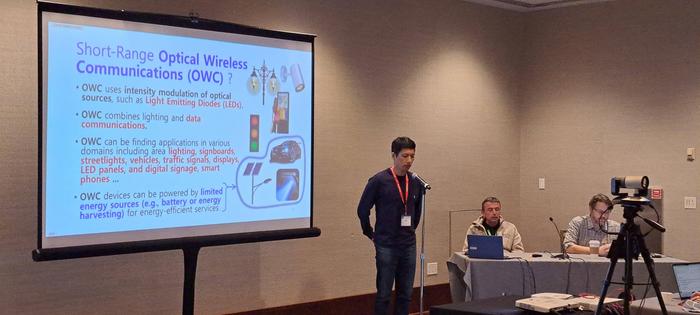South Korean researchers have achieved a landmark feat by setting international standards for short-range wireless communication technology, commonly used within a 10 cm range, to enable internet communication.

Credit: Electronics and Telecommunications Research Institute(ETRI)
South Korean researchers have achieved a landmark feat by setting international standards for short-range wireless communication technology, commonly used within a 10 cm range, to enable internet communication.
ETRI(Electronics and Telecommunications Research Institute) announced on the 21st July that the international standard “IETF RFC 9428(Transmission of IPv6 Packets over Near Field Communication)” was formally adopted by the Internet Engineering Task Force(IETF), a semi-private international standardization organization under the Internet Architecture Board(IAB).
Near Field Communication(NFC), a low-power, two-way wireless communication technology, traditionally facilitates data exchange within a range of approximately 10 cm. It has generally been employed in applications that require short-range communication, such as contactless payments, smartphone file-sharing, and NFC tag information access. However, it had not been extensively used for broader internet communication. With the implementation of ETRI’s ‘RFC 9428’ standard, internet usage within short-range wireless communication environments is now possible.
By utilizing NFC-based internet communication, payment environments between NFC devices can also leverage internet-based communication. As a result, offline merchants can use their existing NFC payment services without the need for installing separate dedicated payment terminals.
While commonly used wireless technologies like Wi-Fi and Bluetooth enable communication over relatively broader areas—with Wi-Fi covering up to 40m and Bluetooth up to 10m—the newly standardized technology communicates within an average range of 10 cm.
This makes it less susceptible to hacking risks compared to Wi-Fi and Bluetooth, thereby offering a secure channel for data transmission in wireless communication environments.
Furthermore, this technology represents a unique achievement held exclusively by ETRI’s Standard Research Division. In tandem with its international standardization efforts, ETRI has secured two international(U.S.) patents registered in the ETRI RFC9428 standard. This accomplishment is expected to serve as a cornerstone for generating high-value outcomes in the future domestic and international markets for IoT-related payment and authentication services.
During the development of RFC 9428, the research team participated in interoperability testing organized by the European Telecommunications Standards Institute(ETSI), specifically the 6lo-6tisch plugtest in the IoT domain(IETF 6lo WG and 6tisch WG). Eminent international experts in low-power Internet communication technology conducted technical tests and demonstrations, achieving high scores. This validation of technical prowess garnered international recognition and ETRI’s technology was introduced as a superior achievement in the Asia-Pacific Network Information Center(APNIC) under the International Telecommunication Union (ITU-T) sector.
1ETRI’s Standard Research Division Director, Kang Shin-gak, emphasized the significance of this international standardization, stating, “The development of this international standard and the acquisition of standard patents hold great meaning. It represents a valuable achievement that can lead innovation in the IoT field and pave the way for future market dominance.”
Additionally, this technology is envisioned by the research team to find extensive utility in diverse IoT environments, including smart homes, smart buildings, and smart factories, where various forms of payments and communication environments utilizing contactless short-range wireless communication are required.
The regular IETF meetings, held four times a year, see participation from over 50 countries, featuring the involvement of experts from global corporations, research institutions, and academia, including Cisco and Ericsson, with a total of more than 1,500 specialists.
ETRI has a storied history of continuous standardization activities and research in prominent international organizations, including IETF, where it has contributed to the development of over 15 international standards, including next-generation Internet protocols (IPv6), mobile technologies, and IoT technologies.
###
ETRI is actively engaged in standardization activities within international standardization bodies such as IETF and ITU-T with the aim of establishing international standards in the field of IoT. This effort is facilitated through the support of the Ministry of Science and ICT’s Information and Communication Broadcasting Standardization Support Project.



